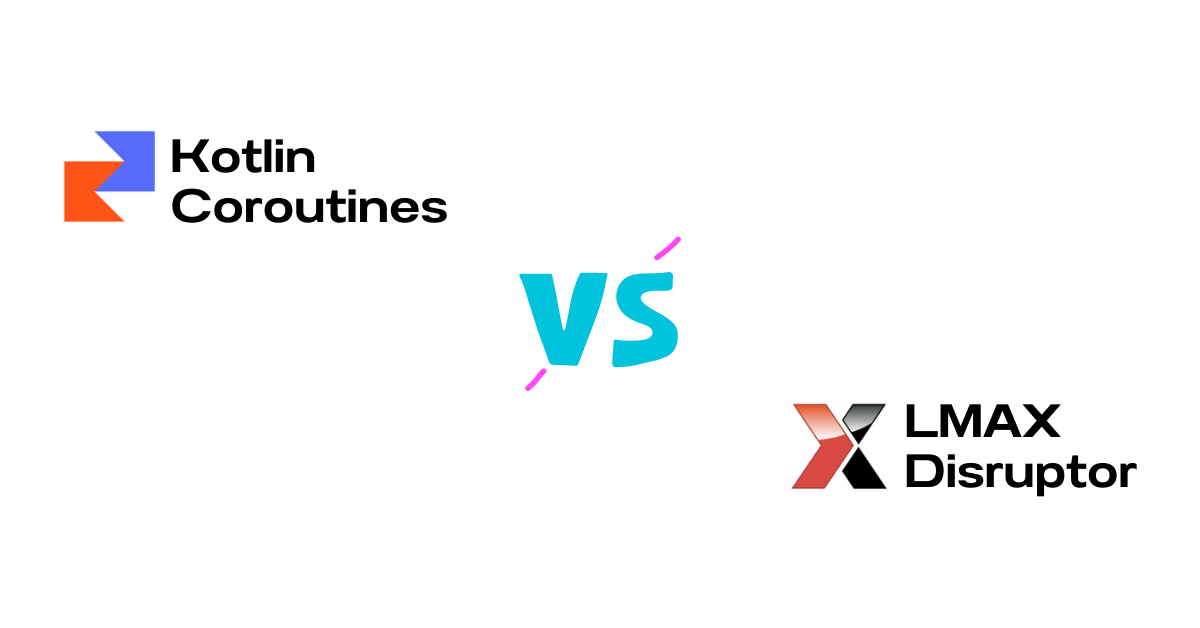Asynchronous and concurrent programming are critical for building high-performance and scalable applications. But with so many tools available, it can be challenging to choose the right one for the job. In the JVM ecosystem, Kotlin Coroutines and LMAX Disruptor are two popular options for asynchronous and concurrent programming. But which one is better?

Introduction
Kotlin Coroutines is a lightweight and expressive library for writing asynchronous, non-blocking code in Kotlin. It provides an easy-to-understand way to write concurrent programs. On the other hand, LMAX Disruptor is a high-performance inter-thread communication library for the JVM that provides a fast and efficient way to pass data between threads. It’s worth noting that LMAX Disruptor is used as the underlying communication mechanism in many high-performance systems, including the logging framework Log4j2.
To help developers choose the best tool for their specific use case, I conducted a benchmarking project on thanhtrixx/concurrency-library-benchmark (github.com) that compares the performance of Kotlin Coroutines and LMAX Disruptor. The project uses the Java Microbenchmark Harness (JMH) for accurate and reliable performance measurements. The benchmark measures the time it takes for a large number of events to be processed by each library.
Benchmarking Process
To ensure accurate and reliable performance measurements, the project uses the Java Microbenchmark Harness (JMH). My benchmarking project measures the time it takes for a large number of events to be processed by each library. I compare the performance of Kotlin Coroutines and LMAX Disruptor, and then provide results that can help developers choose the best tool for their specific use case.
Benchmark Results
After running the benchmark, the results will be generated in the result directory. For a fair comparison between the two libraries, these results can be visualized using https://jmh.morethan.io/.
- Lmax-Disruptor vs Kotlin Coroutines: bufferSize = [512], numberEvent=[20, 10000, 100000] with GC info
![Lmax-Disruptor vs Kotlin Coroutines: bufferSize = [512], numberEvent=[20, 10000, 100000] with GC info](/img/post/bufferSize-512-numberEvent-20-10000-100000.png)
- Lmax-Disruptor vs Kotlin Coroutines: bufferSize = [128, 512, 1024], numberEvent=[100, 1000, 10000, 20000]
![Lmax-Disruptor vs Kotlin Coroutines: bufferSize = [128, 512, 1024], numberEvent=[100, 1000, 10000, 20000]](/img/post/bufferSize-128-512-1024-numberEvent-100-1000-100000-200000.png)
Conclusion
Based on the benchmark results, Kotlin Coroutines is the better choice for applications where high throughput is essential. However, LMAX Disruptor may be more suitable for memory-constrained environments. Ultimately, the choice between the two libraries depends on the specific requirements of the application and the trade-offs the developer is willing to make. This benchmarking project can help developers make informed decisions when choosing a tool for asynchronous and concurrent programming. If you’re interested in contributing to this project or have any questions, please reach me to the project maintainers. I always looking for ways to improve the benchmark and make it more comprehensive. In conclusion, Kotlin Coroutines and LMAX Disruptor are both excellent tools for asynchronous and concurrent programming. Understanding their strengths and weaknesses is crucial in making the right choice for your application.
Reference links
- thanhtrixx/concurrency-library-benchmark (github.com)
- Coroutines
- LMAX Disruptor
- openjdk/jmh: https://openjdk.org/projects/code-tools/jmh (github.com)
Thank you for reading this far.